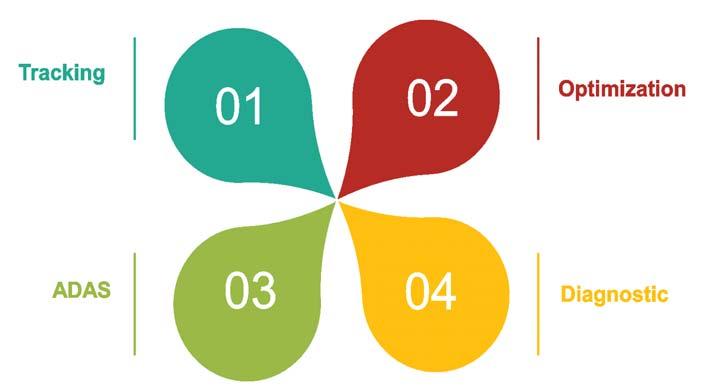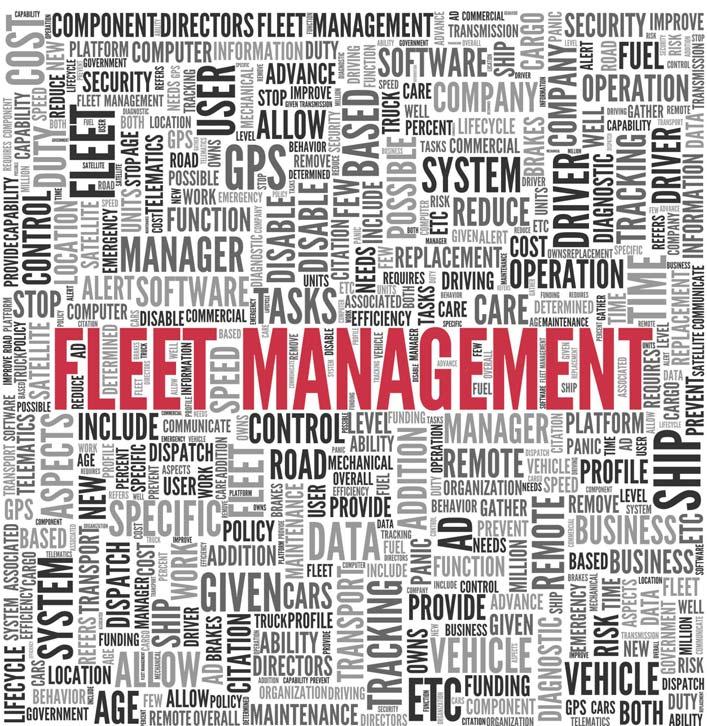
5 minute read
Smart Fleet Management
Atul Kumar
Team Lead, MarketsandMarkets
Advertisement
Atul Kumar has 5+ years’ experience in Primary & Secondary Market Research, Business Analysis, Market Trend Mapping & Forecast, and CompeƟ Ɵ ve Intelligence etc. Presently he is associated with MarketsandMarkets as Sr. Research Analyst for Automobile & TransportaƟ on research pracƟ ce.
leet management is gaining momentum in the industry as fl eet operators require real-Ɵ me tracking, driver management, scheduling of maintenance, servicing of vehicles, vehicle health opƟ mizaƟ on, and others. These features have helped fl eet operators to track lost or stolen cargo and eff ecƟ vely address issues related to it. Also, there have been advancements in overthe-air (OTA) security.
With the increased use of internet and recent developments in connecƟ vity, there has been an increased demand for fl eet management to ensure vehicle safety and cut down the idle Ɵ me. The fl eet management soluƟ on providers off er an integraƟ on of in-vehicle devices with mulƟ ple soŌ ware and services to reduce the turnaround Ɵ me and increase overall profi tability for the operator. The fl eet management works on the principle of “Being Connected.” The short range connecƟ vity technology is used to share informaƟ on regarding traffi c jams, posiƟ on, and best possible route and helps in avoiding collisions. There is increased demand for developing systems that will contribute toward reducƟ on of traffi c fataliƟ es, help save fuel, and increase effi ciency. The market for connecƟ vity technologies is on the rise, and regulatory bodies in Europe and North America are planning to mandate some of these technologies. For example, in Europe, eCall has been mandated for all the new vehicles in the near future. Smart fl eet management soluƟ ons are used across various modes of transportaƟ on ranging from commercial vehicles, vessel maintenance, tracking of railcars, and others. The fl eet management technology enhances transparency and enables real-Ɵ me visibility of fl eet movement, fuel management, vehicle maintenance, diagnosƟ cs, driver management, and realƟ me monitoring. Further, it enhances the safety of vehicles and off ers cloud storage faciliƟ es and data analyƟ cs, which would collecƟ vely contribute to the growth of the market. Real-Ɵ me monitoring is esƟ mated to have the highest growth potenƟ al in the global fl eet management market. It is projected to grow at a promising CAGR from 2017 to 2022. This growth can be aƩ ributed to the proven benefi ts of the system in transport safety.
Fleet Management - Major Components
The smart fl eet management market can be segmented into Global PosiƟ oning System (GPS), geo-fencing, fuel sensors, advanced driver assistance systems (ADAS), and remote diagnosƟ cs.
The market has a promising growth potenƟ al for several reasons, including the increasing demand for safety and security in container management and railways. In the automoƟ ve sector, fl eet management helps to minimize the risks associated with labor, equipment, and vehicle maintenance cost.
Growing demand for Smart Fleet Management
Developing countries are focused on improving transportaƟ on safety and are coming up with stringent safety laws related to connecƟ vity of fl eet with the emergency service providers. Mandates such as e-call services have helped the fl eet owners in geƫ ng alerts in case of emergency.
Fleet operators and logisƟ cs companies can capitalize on fl eet management technology as it is expected to be one of the main drivers of profi tability in the near future. In Europe, the government has made it mandatory to have a lane departure warning system in all trucks by 2018. Likewise, vessel containers must be equipped with tracking system and fuel monitoring systems by 2020. The smart fl eet management market is further driven by the legislaƟ ons about transport safety, advancement in technology, and increased demand for large ships and vessel containers across the globe.
Increasing demand for cloud services for Smart Fleet Management Market
With increasing demand for connecƟ vity and fl eet management, smart devices and applicaƟ ons have become the go-to tools for fl eet operators. Some of the key issues addressed by cloud management soluƟ ons for cloud deployment model include tracking assets, driver monitoring, fl eet opƟ mizaƟ on, and others. Cloud enables the backup and recovery of data and applicaƟ ons on a secondary storage or infrastructure. OrganizaƟ ons are deploying diff erent cloud models to overcome the loopholes of tradiƟ onal fl eet management soluƟ ons. Moreover, low maintenance requirements and cost eff ecƟ veness of the soluƟ ons are some of the other benefi ts driving the growth of the cloud market. Real-Ɵ me monitoring, geofencing, advanced driver assistance systems (ADAS), and diagnosƟ c features are incorporated in railways, marine transport, and automoƟ ve due to the increase in demand for fl eet safety and security in transportaƟ on of goods and passengers.
According to experts, fl eet management is expected to grow rapidly in the developing naƟ ons. Due to regulatory mandates, Asia-Pacifi c has seen a strong adopƟ on of fl eet management soluƟ ons such as the installaƟ on of Global PosiƟ oning System (GPS) in commercial vehicles.
Rising trend of Smart Fleet Management
ArƟ fi cial Intelligence (AI) infl uences the fl eet operaƟ on and management. The trucks with moving liŌ s and mechanical components funcƟ on eff ecƟ vely on the move, especially in the mariƟ me industry.

Platooning uses the automaƟ on technology to allow trucks to travel in connected convoys. Another form of AI is used in the trailers and large trucks; a device is mounted behind the rear view. This device acts as the computerized command center, which captures a 360-degree video of the surroundings. The device uses custom built AI to determine unsafe acƟ ons such as tailgaƟ ng and accidents on the road and alerts the fl eet operator in real-Ɵ me for urgent events. These types of AI devices have opportuniƟ es in the railway as well as the mariƟ me industry.
Major Players - Smart Fleet Management Market
Some of the major players in the smart fl eet management market are Cisco Systems, Inc. (U.S.), Verizon CommunicaƟ ons, Inc. (U.S.), Robert Bosch (Germany), IBM CorporaƟ on (U.S.), and Precious Shipping Public Company Limited (U.S.). These players have adopted various business strategies such as new product development, expansion, and partnership to increase their share in the smart fl eet management market.









